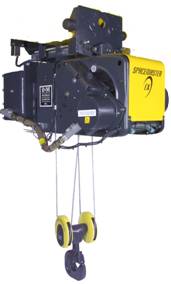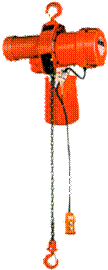|
NAI TECHNICAL REPORT |
|
Technical Brief: Wire Rope Hoists vs. Chain Hoists Modern designs and upgraded materials have greatly improved the performance of both electric chain and wire rope hoists. New technology has transformed chain hoists into a rugged and durable product. Today, both types of hoists compete equally for typical industrial applications in capacities up to 7.5 tons. |
|
Hoist Type Characteristics
Electric chain hoists: · Lift by pulling the chain through sprockets and depositing the chain into a chain container · Require less maintenance · Are less expensive · Provide true vertical lift at no extra cost · Are common for applications below 7.5 tons Wire rope hoists: · Lift by wrapping cable around a grooved drum · Offer a wide variety of lifting speeds · Offer a wide array of options · Can be rated H-5 (severe duty) · Dominate the market at 7.5 tons and above
Comparison of Hoist Types Hoist manufacturers provide a wide range of choices for both chain and wire hoists with capacities up to 7.5 tons, but the selection of chain hoists above 7.5 tons is more limited. The use of chain hoists is common for applications below 7.5 tons, and the market above 7.5 tons is dominated by wire rope hoists. Both types of hoist use similar motors, brakes and controls. The main difference between electric chain hoists and wire rope hoists is in the design of the lifting mechanism. Be sure to request an H-4 rating on either your electric chain or wire rope hoist to ensure long life and low maintenance.
Duty Ratings Duty ratings are a better indicator of hoist durability than hoist type (chain or wire rope). Electric chain and wire rope hoists are rated either H-3 (moderate duty) or H-4 (heavy duty).
|


|
Consider an electric chain hoist for: · 8-10 hours of use per day · Fewer than 20 lifts per hour · Less than 30 minutes motor on time per hour · High percentage of lifts at full capacity · True vertical lift · High durability at low cost |
|
For more hoist information, please contact our Parts Department at (781) 897-4104 or bgw@naicranes.com |


|
NAI TECHNICAL REPORT |

|
Second Quarter 2010 |